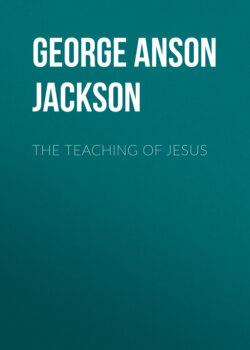Читать книгу The Teaching of Jesus - George Anson Jackson - Страница 6
На сайте Литреса книга снята с продажи.
INTRODUCTORY
ОглавлениеTable of Contents
"A prophet mighty in word before God and all the people."--LUKE xxiv. 19. "A teacher come from God."--JOHN iii. 2.
In speaking of the teaching of Jesus it is scarcely possible at the present day to avoid at least a reference to two other closely-related topics, viz. the relation of Christ's teaching to the rest of the New Testament, and the trustworthiness of the Gospels in which that teaching is recorded. Adequate discussion of either of these questions here and now is not possible; it must suffice to indicate very briefly the direction in which, as it appears to the writer, the truth may be found.
First, then, as to the relation of the teaching of Jesus to the rest of the New Testament, and especially to the Epistles of St. Paul. There can be no doubt, largely, I suppose, through the influence of the Reformers, that the words of Jesus have not always received the attention that has been given to the writings of Paul. Nor is this apparent misplacing of the accent the wholly unreasonable thing which at first sight it may seem. After all, the most important thing in the New Testament--that which saves--is not anything that Jesus said, but what He did; not His teaching, but His death. This, the Gospels themselves being witness, is the culmination and crown of Revelation; and it is this which, in the Epistles, and pre-eminently the Epistles of Paul, fills so large a place. Moreover, it ought plainly to be said that the Church has never been guilty of ignoring the words of her Lord in the wholesale fashion suggested by some popular religious writers of our day. Really, the Gospels are not a discovery of yesterday, nor even of the day before yesterday. They have been in the hands of the Church from the beginning, and, though she has not always valued them according to their true and priceless worth, she has never failed to number them with the choicest jewels in the casket of Holy Scripture. Nevertheless, it may be freely granted that the teaching of Jesus has not always received its due at the Church's hands. "Theology," one orthodox and Evangelical divine justly complains, "has done no sort of justice to the Ethics of Jesus."[1] But in our endeavour to rectify one error on the one side, let us see to it that we do not stumble into another and worse on the other side. The doctrines of Paul are not so much theological baggage, of which the Church would do well straightway to disencumber itself. After all that the young science of Biblical Theology has done to reveal the manifold variety of New Testament doctrine, the book still remains a unity; and the attempt to play off one part of it against another--the Gospels against the Epistles, or the Epistles against the Gospels--is to be sternly resented and resisted. To St. Paul himself any such rivalry would have been impossible, and, indeed, unthinkable. There was no claim which he made with more passionate vehemence than that the message which he delivered was not his, but Christ's. "As touching the gospel which was preached by me," he says, "neither did I receive it from man, nor was I taught it, but it came to me through revelation of Jesus Christ." The Spirit who spoke through him and his brother apostles was not an alien spirit, but the Spirit of Christ, given according to the promise of Christ, to make known the things of Christ; so that there is a very true sense in which their words may be called "the final testimony of Jesus to Himself." "We have the mind of Christ," Paul said, and both in the Epistles and the Gospels we may seek and find the teaching of Jesus.[2]
It is, however, with the teaching of Jesus as it is recorded in the Gospels that, in these chapters, we are mainly concerned. We come, therefore to our second question: Can we trust the Four Gospels? And this question must be answered in even fewer words than were given to the last. As to the external evidence, let us hear the judgment of the great German scholar, Harnack. Harnack is a critic who is ready to give to the winds with both hands many things which are dear to us as life itself; yet this is how he writes in one of his most recent works: "Sixty years ago David Friedrich Strauss thought that he had almost entirely destroyed the historical credibility, not only of the fourth, but also of the first three Gospels as well. The historical criticism of two generations has succeeded in restoring that credibility in its main outlines."[3] When, from the external, we turn to the internal evidence, we are on incontestable ground. The words of Jesus need no credentials, they carry their own credentials; they authenticate themselves. Christian men and women reading, e.g., the fourteenth of St. John's Gospel say within themselves that if these are not the words of Jesus, a greater than Jesus is here; and they are right. The oft-quoted challenge of John Stuart Mill is as unanswerable to-day as ever it was. "It is of no use to say," he declares, "that Christ, as exhibited in the Gospels, is not historical, and that we know not how much of what is admirable has been super-added by the traditions of His followers. … Who among His disciples, or among their proselytes, was capable of inventing the sayings ascribed to Jesus, or of imagining the life and character revealed in the Gospels?"[4]
